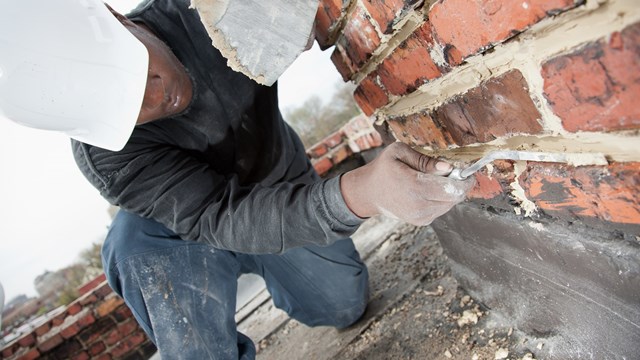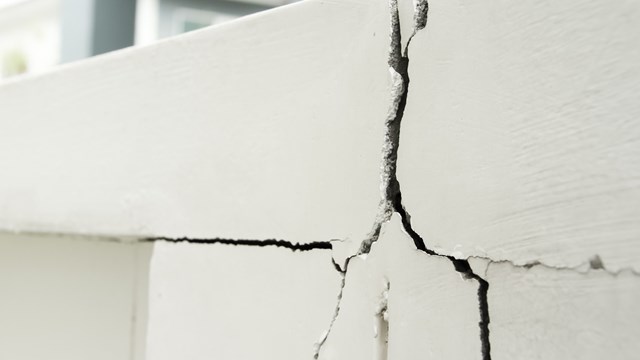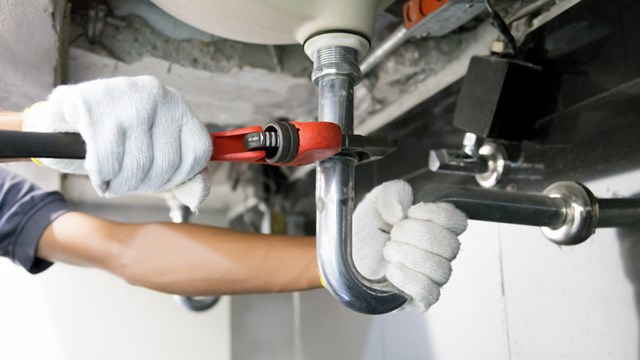A deteriorating or poorly-maintained building façade can certainly be an eyesore—but if bricks, stucco, siding, or other materials are at risk of crumbling or falling off your property, curb appeal is the least of your worries. In addition to the obvious danger such incidents pose to public safety, they also represent a major liability for your building or association.
That’s why it’s so important—indeed, why it’s legally mandated in some states, including Florida—to inspect your facades and everything attached to them on a regular basis. The scheduling of inspections is generally dictated by local government and other regulatory agencies, and often by lenders as well. Maintaining the schedule is up to your board and your managing agent, or your board alone if your property is self-managed.
What Causes Façade Erosion?
By definition, the façades of residential buildings are exposed and subject to the elements. While those elements may differ (freezing and thawing in the north and heavy rain and wind in the south) their effects on building exteriors are essentially the same. Across the board, the chief elemental culprit in façade erosion is water. Infiltration of water into a building can damage the bricks, pointing, and even the steel of the interior structure–to say nothing of what that same water can do if it gets into the interior of individual units, damaging floors, ceilings, and walls, and leading to toxic mold infestation, which can lead to a host of health problems for occupants.
“Regular exterior inspections are crucial for the safety of residents, staff, and passers-by,” says Antonio Argibay, managing principal of Meridian Design Associates, with offices in Miami and New York. “Over time, weathering and wear can compromise structural elements, leading to hazards like falling debris. Routine checks help identify issues early, ensuring safety and preventing costly repairs. By maintaining the building’s integrity, inspections reduce risks and ensure compliance with safety standards.”
Douglas Weinstein, senior vice president of operations for AKAM Management, with offices in both Florida and New York, explains that “in both regions, buildings are subject to two corrosive elements from essentially the same source. “In Florida, we have salt-and-water, and in New York, freeze-and-thaw. These factors account for the biggest problems facing building structures. In New York, being so populous and with everything so close to the sidewalk, it’s incumbent upon ownership and management to do inspections regularly to prevent a tragedy, like masonry falling off and striking a pedestrian. In Florida, though buildings are more spaced out, you still have intense pedestrian activity, resulting in the same problem. You want to make areas around buildings safe for both foot traffic and auto traffic. Falling bricks can strike cars as well, and that can be equally or even more dangerous.”
Façades and parking interiors must be inspected regularly,” says Giulia Alimonti, vice president for building exteriors with Entuitive, a Canadian engineering firm with offices throughout the United States. “It is very important, crucial really, to have both building exteriors and the interior of parking structures inspected regularly. Inspections are crucial to the maintenance of both the buildings themselves, as well as the residents and passers-by. Because of the age of housing stock in places such as New York, Boston, and even Miami, we have continuing deterioration due to weather. In the northeast, that’s mainly from freezing. In the south, it’s more a combination of water and salt.”
Bruno Bertoli, director of management services for Evergreen Management, located in Bedford, New Hampshire, advises all association managers to make regular inspections on the exterior of all buildings in the associations they manage. “Inspection is the first step to identify any issues the property façade or exterior may have and provides an opportunity to find those issues or problems in their early stages. Management and the board can stay ahead of any issues that might put the structure of the building or residents in risk. Identifying issues early saves the association money and avoids accidents. The key is for the board and community to be proactive about correcting these problems in a timely manner.”
Catching Trouble Early—What to Look For
Water-based issues, the major cause of façade and exterior deterioration, can, as mentioned, cause different problems depending on weather conditions. In southern coastal areas like Florida, a major condition known as spalling can damage not only the façade but the steel structure inside the façade as well.
Weinstein explains that “concrete spalling is when water gets into masonry and attacks the steel inside–components such as joist or rebar. The steel components expand as they rust–up to seven times their original size. This expansion forces the masonry out. It cracks and loosens. It happens all the time.”
Bertoli notes that deterioration from water infiltration can affect more than just façades. Balconies and decks can deteriorate, too. The water infiltration can also cause roofing issues, window and door failure, foundation cracks, and settlement.
Simple aging plays a role as well, explains Alimonti. “The most common defect we find is deterioration due to aging of building materials. Aging is a result of exposure to weather year after year. Water gets into small gaps and, year after year, the cracks get deeper and deeper. If not repaired as part of a regular maintenance program, you can get very unsafe conditions. Concrete…can get wet right down to the steel. The steel gets wet and starts expanding and cracks the concrete. It’s very dangerous because steel corrodes and loses material and strength. Inspectors look for things that are out of order,” she continues, “bulging bricks, leaning parapets, anything that looks like it couldn’t have been built that way. Cracks are the number one red flag. Missing parts, spalled brick, and limestone. Discoloration from efflorescence.”
“Falling debris from buildings is often fatal, and in severe cases of neglect, structural collapse can also occur, resulting in loss of life,” says Argibay. “Roofs and their waterproofing, when compromised, allow moisture intrusion and mold growth. Roof inspections typically focus on assessing the wear of roofing materials, as leaks are usually addressed quickly. In contrast, the damage and risks of a compromised façade are less visible and often go unnoticed.”
Regular inspection can bring these problems to the attention of the community and can be corrected before a disaster. This has become a particularly important issue here in Florida in the aftermath of the Surfside building collapse disaster a few years back.
Required Inspections
Weinstein notes, “In Florida, we are just catching up to the fact that buildings need to be inspected more frequently. The change in behavior in Florida is due to Surfside. Before that collapse only Broward County and Miami Dade County required regular inspections of high-rises and then not until the building reached forty years of age. Now, all buildings over twenty-five years of age must be inspected by the end of this year and then every ten years thereafter. We also have another new law in Florida that all owners, rental or condominium, no exceptions, are required to do a structural integrity reserve study. This will force condominium associations to adequately reserve for structural repairs.”
Another byproduct of the Surfside disaster is that condos need financing to do necessary repairs and potential lenders are looking at them for the first time ever—not just in Florida, but around the country.
“In New York,” says Alimonti, “required inspections are every five years for façades and six years for parking structures. Façade inspections, known as FISP (façade inspection and safety program) must be conducted by a qualified exterior wall inspector, usually an architect or engineer and they must generate a report for the building department. Reports classify buildings as safe, safe with repairs and a maintenance program, or unsafe. The Building Department also requires inspection of parapets to be done every year as well by whoever maintains them and that a report be made available to the Building Department upon request. Garages require a structural engineer, and a report must be filed with the Building Department with the same safe or unsafe designations.”
In New England, Bertoli explains, “Each manager conducts inspections differently. Managers are not general contractors, and should use their preferred vendors to provide a more in-depth inspection if a specific part of the building seems to be failing. If a roof visually seems in bad shape, a follow-up inspection from a certified roofing company would be very important to confirm if the roof just needs a repair, or may be at the end of its expected useful life.
“In addition to a qualified inspector specific to the trade and local vendors for expert opinions,” Bertoli continues, “complete a reserve study and take that study into account when trying to identify the useful life of the infrastructural components. If the maintenance team or a preferred vendor finds a serious problem with the exterior of the building, this needs to be communicated immediately to the association manager. The manager would take this information to the board. Repairs should be made as soon as possible and in accordance with local government requirements and standards.”
Maintaining your façade and making necessary repairs quickly is critical for the health of your physical plant, its residents and its visitors, as well as passers-by. Don’t minimize these issues. They can be deadly.
A.J. Sidransky is a staff writer/reporter with CooperatorNews, and a published novelist. He may be reached at alan@yrinc.com










Leave a Comment